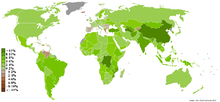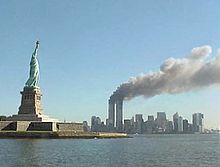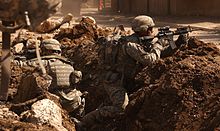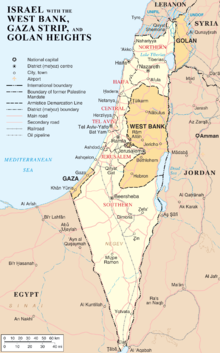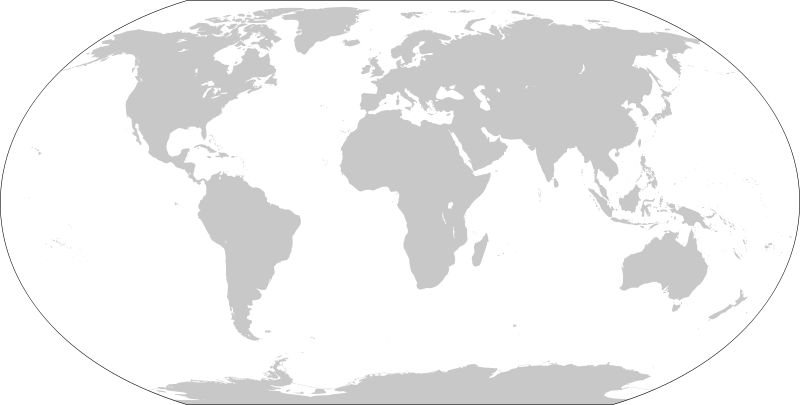- Contemporary history
-
"Contemporary" redirects here. For other uses, see Contemporary (disambiguation).
Human history
↑ Prehistory - Recorded History
↓Future Contemporary history describes the period timeframe that is without any intervening time closely connected to the present and is a certain perspective of modern history. The term "contemporary history" has been in use at least by the early 19th century.[1] In the widest context of this use, contemporary history is that part of history still in living memory. Based on human lifespan, contemporary history would extend for a period of approximately 80 years. Obviously, this concept shifts in absolute terms as the generations pass. In a narrower sense, "contemporary history" may refer to the history remembered by most adults currently living, extending to about a generation or roughly 30 years. From the perspective of the 2010s, thus, contemporary history would include the period since the mid-to-late 20th century, including the postwar period and the Cold War.
The present age possesses a distinct character of its own.[2][3]
More than most periods of like duration, it is the direct consummation of the years immediately preceding. It differs from them as the harvest differs from the seed-time.—Contemporary History of the World, Edwin Grosvenor[2]While there have been scientific accomplishments and humanitarian achievements during the present age (i.e., the modern age), the contemporary era has seen scientific and political progress, not so much in what has been originated as by what has been developed. Notable achievements have been those such as the redefinition of nationalities and nations and the ongoing technological advances that marked the 20th century.
In contemporary history of science and technology, history notably includes spaceflight, nuclear technology, laser and semiconductor technology and the beginning Information Age, and the development of molecular biology and genetic engineering, and the development of particle physics and the Standard Model of quantum field theory.
In contemporary European history, there was the Revolutions of 1989, the dissolution of the Soviet Union, and the process of European integration. In contemporary Asian history, there was the history of the People's Republic of China, Indian independence, the Korean, Vietnam and Afghanistan wars, and the US Forces stationed in Japan and in South Korea. In the Middle East, there was the Arab-Israeli conflict and the conflict between Arab nationalism and Islamism. In contemporary African history, there was apartheid in South Africa and its abolition, Decolonization, and a multitude of wars[4] on the continent.
Contents
Contemporary era (AKA Technology Era)
Notable events of this modern period include two World wars and the Cold War.

20th century
At the turn of the 20th century, the world saw a series of great conflagrations, World War I and World War II. Near the end of the first great war, there were a series of Russian Revolutions and a Russian Civil War. In between the great wars, the "Twenties" saw a great rise in prosperity where progress and new technology took hold of the world, but this was soon ended by the Great Depression. During this time, the League of Nations was formed to deal with global issues, but failed to garner enough support by the leading powers and a series of crises once again lead the world into another epoch of violence.
Post-1945 World
The post-1945 World is characterized by the influence of the United States and the Soviet Union.
The Cold War began in 1945 and lasted into 1989. The Space Age was concurrent with this time, encompassing the activities related to the Space Race, space exploration, space technology, and the cultural developments influenced by these events. Pax Americana is an appellation applied to the historical concept of relative liberal peace in the Western world, resulting from the preponderance of power enjoyed by the United States of America and, in its contemporaneousness connotations, the peace established after the end of World War II in 1945.
The post-1945 world experienced the establishment and defense of democratic states. Throughout post-1945 period, the Cold War was expressed through military coalitions, espionage, weapons development, invasions, propaganda, and competitive technological development. The Soviet Union created the Eastern Bloc of countries that it occupied, annexing some as Soviet Socialist Republics and maintaining others as satellite states that would later form the Warsaw Pact. The United States and various western European countries began a containment policy of communism and forged alliances to this end, including NATO. The conflict included defense spending, a conventional and nuclear arms race, and various proxy wars; the two superpowers never fought one another directly.
The post-1989 World saw the abolishment of totalitarian regimes of the Cold War and the abolishment of Cold War superpower client states. By the Democratizing Revolutions of Eastern Europe in 1989 and the Cold War effectively ended by the Malta Summit on December 3, 1989. The Soviet Union was dissolved on the last day of 1991. The "post-Cold War regimes" established were democratic republics, not the oligarchic republics.
In South America, military regimes supported by the CIA, such as seen in the United States intervention in Chile, give way..[citation needed] In Southeast Asia, developmental dictatorships were overthrown by uprising of people.[citation needed]
Information age and computers
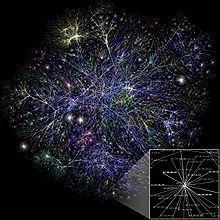 A Visualization of the various routes through a portion of the Internet. Partial map of the Internet based in 2005.
A Visualization of the various routes through a portion of the Internet. Partial map of the Internet based in 2005.
The Information Age or Information Era, also commonly known as the Age of the Computer, is an idea that the current age will be characterized by the ability of individuals to transfer information freely, and to have instant access to knowledge that would have been difficult or impossible to find previously. The idea is heavily linked to the concept of a Digital Age or Digital Revolution, and carries the ramifications of a shift from traditional industry that the Industrial Revolution brought through industrialization, to an economy based around the manipulation of information. The period is generally said to have begun in the latter half of the 20th century, though the particular date varies. The term began its use around the late 1980s and early 1990s, and has been used up to the present with the availability of the Internet.
During the late 1990s, both Internet directories and search engines were popular—Yahoo! and Altavista (both founded 1995) were the respective industry leaders. By late 2001, the directory model had begun to give way to search engines, tracking the rise of Google (founded 1998), which had developed new approaches to relevancy ranking. Directory features, while still commonly available, became after-thoughts to search engines. Database size, which had been a significant marketing feature through the early 2000s, was similarly displaced by emphasis on relevancy ranking, the methods by which search engines attempt to sort the best results first.
"Web 2.0" is characterized as facilitating communication, information sharing, interoperability, User-centered design[5] and collaboration on the World Wide Web. It has led to the development and evolution of web-based communities, hosted services, and web applications. Examples include social-networking sites, video-sharing sites, wikis, blogs, mashups and folksonomies.
Development of Eastern powers

For more details on this topic, see List of countries by GDP (real) growth rate.Country % Growth  China
China11.90% [6]  India
India10.2% [6] While Asia has seen considerable economic development, China in particular has experienced immense growth, moving toward the status of a regional power and billion-consumer market. India, along with other developing non-western countries, is also growing rapidly, and has begun integrating itself into the world economy.
After China joined the World Trade Organization, the standard of living in the country has improved significantly as China saw the reappearance of the middle class. Wealth disparity between East and the Western hinterlands continued to widen by the day, prompting government programs to "develop the West", taking on such ambitious projects such as the Qinghai-Tibet Railway. The burden of education was greater than ever. Rampant corruption continued despite Premier Zhu's anti-corruption campaign that executed many officials.
By the beginning of 2009, about 300 million people in India – equivalent to the entire population of the entire United States – have escaped extreme poverty.[7] The fruits of India's economic liberalization policies reached their peak in 2007, with India recording its highest GDP growth rate of 9%.[8] With this, India became the second fastest growing major economy in the world, next only to China.[9] An Organisation for Economic Co-operation and Development (OECD) report states that the average growth rate 7.5% will double the average income in a decade, and more reforms would speed up the pace.[10]
The majority of the Next Eleven economies are Asian countries. A number of newly industrialized countries have emerged from Asia, including China, India, Malaysia, the Philippines and Thailand.
European Union and Russian Federation
In Europe, the European Union is a geo-political union founded upon numerous treaties and has undergone expansions to include a majority of states in Europe. Its origins date back to the post-World War II era, in particular the foundation of the European Coal and Steel Community in Paris 1951, following the "Schuman declaration", or the Treaties of Rome establishing the European Economic Community and the European Atomic Energy Community. Both these bodies are now part of the European Union, which was formed under that name in 1993.
In the Post-communist period, the Russian Federation became an independent country. Russia was the largest of the fifteen republics that made up the Soviet Union, accounting for over 60% of the GDP and over half of the Soviet population. Russians also dominated the Soviet military and the Communist Party. Thus, Russia was widely accepted as the Soviet Union's successor state in diplomatic affairs and it assumed the USSR's permanent membership and veto in the UN Security Council; see Russia and the United Nations. Russia today shares many continuities of political culture and social structure with its tsarist and Soviet past.
Concerning NATO–Russia relations, the NATO-Russia Council has been an official diplomatic tool for handling security issues and joint projects between NATO and Russia, involving "consensus-building, consultations, joint decisions and joint actions." [11][12] "Joint decisions and actions", taken under NATO-Russia Council agreements, include fighting terrorism,[13][14] military cooperation (joint military exercises[15] and personnel training[16]), cooperation on Afghanistan, industrial cooperation, cooperation on defence interoperability, non-proliferation, and other areas.[17] Because NATO and Russia have similar ambitions and mutual challenges, the NATO-Russia Council is seen by both sides as effective at building diplomatic agreements between all parties involved.
Late modern terrorism and warfare
Major political developments in the 2000s for the Western World and the Middle East revolved around recent modern terrorism, the War on Terrorism, the Afghanistan War, and the Iraq War.
The September 11 attacks were a series of coordinated suicide attacks by Al-Qaeda upon the United States on September 11, 2001. On that morning, 19 Al-Qaeda terrorists hijacked four commercial passenger jet airliners.[18][19] The hijackers intentionally crashed two of the airliners into the Twin Towers of the World Trade Center in New York City, killing everyone on board and many others working in the buildings. Both buildings collapsed within two hours, destroying nearby buildings and damaging others. The hijackers crashed a third airliner into the Pentagon in Arlington, Virginia, just outside of Washington, D.C. The fourth plane crashed into a field near Shanksville in rural Somerset County, Pennsylvania, after some of its passengers and flight crew attempted to retake control of the plane, which the hijackers had redirected toward Washington, D.C. Major terrorist events after the September 11, 2001 Attacks include the Moscow Theatre Siege, the 2003 Istanbul bombings, the Madrid train bombings, the Beslan school hostage crisis, the 2005 London bombings, the October 2005 New Delhi bombings, and the 2008 Mumbai Hotel Siege.
The United States responded to the September 11, 2001 attacks by launching a "Global War on Terrorism", invading Afghanistan to depose the Taliban, who had harbored al-Qaeda terrorists, and enacting the Patriot Act. Many other countries also strengthened their anti-terrorism legislation and expanded law enforcement powers. The 'Global War on Terrorism' is the military, political, legal and ideological conflict against Islamic terrorism and Islamic militants since the 2001 attacks.
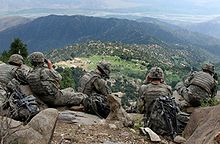 U.S. Army troops in Kunar province
U.S. Army troops in Kunar province
The War in Afghanistan began in late 2001 and was launched by the United States with the United Kingdom, and NATO-led, UN authorized ISAF in response to the September 11 attacks. The aim of the invasion was to find the whereabouts of Osama bin Laden and other high-ranking al-Qaeda members and put them on trial, to destroy the whole organization of al-Qaeda, and to remove the Taliban regime which supported and gave safe harbor to al-Qaeda. The Bush administration policy and the Bush Doctrine stated forces would not distinguish between terrorist organizations and nations or governments that harbor them. Two military operations in Afghanistan are fighting for control over the country. Operation Enduring Freedom (OEF) is a United States combat operation involving some coalition partners and currently operating primarily in the eastern and southern parts of the country along the Pakistan border. The second operation is the International Security Assistance Force (ISAF), which was established by the UN Security Council at the end of 2001 to secure Kabul and the surrounding areas. NATO assumed control of ISAF in 2003.
The multinational infantry actions, with additional ground forces supplied by the Afghan Northern Alliance, and aerial bombing campaign removed the Taliban from power, but Taliban forces have since regained some strength.[20] The war has been less successful in achieving the goal of restricting al-Qaeda's movement than anticipated.[21] Since 2006, Afghanistan has seen threats to its stability from increased Taliban-led insurgent activity, record-high levels of illegal drug production,[22][23] and a fragile government with limited control outside of Kabul.[24] At the end of 2008, the war had been unsuccessful in capturing Osama bin Laden and tensions have grown between the United States and Pakistan due to incidents of Taliban fighters crossing the Pakistan border while being pursued by coalition troops.
The Second Gulf War began in 2003 with the invasion of Iraq by a multinational force.[25] The invasion of Iraq led to an occupation and the eventual capture of Saddam Hussein, who was later executed by the Iraqi Government. Violence against coalition forces and among various sectarian groups soon led to asymmetric warfare with the Iraqi insurgency, strife between many Sunni and Shia Iraqi groups, and al-Qaeda operations in Iraq.[26][27] Member nations of the Coalition withdrew their forces as public opinion favoring troop withdrawals increased and as Iraqi forces began to take responsibility for security.[28][29] In late 2008, the U.S. and Iraqi governments approved a Status of Forces Agreement effective through to the end of 2011.[30] The Iraqi Parliament also ratified a Strategic Framework Agreement with the U.S.,[31][32] aimed at ensuring international cooperation in constitutional rights, threat deterrence, education,[33] energy development, and other areas.[34] In 2009, U.S. President Barack Obama announced an 18-month withdrawal window for "combat forces".
The Obama administration has renamed the War on Terror as the "Overseas Contingency Operation".[35] Its objectives are to protect US citizens and business interests worldwide, break up terrorist cells in the US, and disrupt al-Qaeda and affiliated groups.[36][37] The administration has re-focused US involvement in the conflict on the withdrawal of its troops from Iraq, the closing of Guantanamo Bay detention camp, and the surge in Afghanistan.
Israeli–Palestinian conflict
Main article: Israeli–Palestinian conflictThe Israeli–Palestinian conflict has been an ongoing dispute between Israelis and the Palestinians.[38] It forms part of the wider Arab–Israeli conflict. The two-state solution to the Israeli-Palestinian conflict, is the consensus solution that is currently under discussion by the key parties to the conflict.
A two-state solution envisions two separate states in the Western portion of the historic region of Palestine, one Jewish and another Arab to solve the conflict. According to the idea, the Arab inhabitants would be given citizenship by the new Palestinian state; Palestinian refugees would likely be offered such citizenship as well. Arab citizens of present-day Israel would likely have the choice of staying with Israel, or becoming citizens of the new Palestine.
At present, a considerable majority of both Israelis and Palestinians, according to a number of polls, prefer the two-state solution over any other solution as a means of resolving the conflict.[39][40][41] Most Palestinians view the West Bank and Gaza Strip as constituting the area of their future state, which is a view also accepted by most Israelis.[42] A handful of academics advocate a one-state solution, whereby all of Israel, the Gaza Strip, and West Bank would become a bi-national state with equal rights for all.[43][44]
There are significant areas of disagreement over the shape of any final agreement and also regarding the level of credibility each side sees in the other in upholding basic commitments. Within Israeli and Palestinian society, the conflict generates a wide variety of views and opinions. This serves to highlight the deep divisions which exist not only between Israelis and Palestinians, but also amongst themselves. Since 2003, the Palestinian side has been fractured by conflict between the two major factions: Fatah, the traditionally dominant party, and its more recent electoral challenger, Hamas.
Great Recession
Main article: Late-2000s recessionIn the beginning of the 2000s, there was a global rise in prices in commodities and housing, marking an end to the commodities recession of 1980–2000. The US mortgage-backed securities, which had risks that were hard to assess, were marketed around the world and a broad based credit boom fed a global speculative bubble in real estate and equities. The financial situation was also affected by a sharp increase in oil and food prices. The collapse of the American housing bubble caused the values of securities tied to real estate pricing to plummet thereafter, damaging financial institutions.[45][46] The late-2000s recession, a severe economic recession which began in the United States in 2007,[47] was sparked by the outbreak of a modern financial crisis.[48] The modern financial crisis was linked to earlier lending practices by financial institutions and the trend of securitization of American real estate mortgages.[49] The emergence of Sub-prime loan losses exposed other risky loans and over-inflated asset prices.
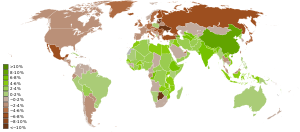 World map showing GDP real growth rates for 2009.
World map showing GDP real growth rates for 2009.
The Great Recession[50][51] spread to much of the industrialized world,[52] and has caused a pronounced deceleration of economic activity. The global recession occurred in an economic environment characterized by various imbalances. This global recession has resulted in a sharp drop in international trade, rising unemployment and slumping commodity prices. The recession renewed interest in Keynesian economic ideas on how to combat recessionary conditions. However, various industrial countries continued to undertake austerity policies to cut deficits, reduced spending, as opposed to following Keynesian theories.
Further information: Effects of the late-2000s recessionArab Spring
Main article: Arab SpringIn the Middle East and North Africa, a series of protests and demonstrations calling for democracy and freedom across the region became known as the Arab Spring. The protests, uprisings and revolutions brought about the overthrow of the Tunisian and Egyptian governments. The period of political liberalization also affected countries that were not strictly part of the Arab world.
Contemporary world
Present and future
See also: Future and Timeline of the futureThe world is currently in the third millennium. The 21st century is the current century of the Christian Era or Common Era in accordance with the Gregorian calendar. It began on January 1, 2001 and will end December 31, 2100. The 2010s, or The Tens, decade runs from January 1, 2010, to December 31, 2019.
The present is the time that is associated with the events perceived directly,[53] not as a recollection or a speculation. It is often represented as a hyperplane in space-time,[54] often called now, although modern mathematical physics demonstrates that such a hyperplane can not be defined uniquely for observers in relative motion (which negates the concept of absolute time and space). The present may also be viewed as a duration (see specious present[55][56]).
The third millennium is the third period of one thousand years. As this millennium is currently in progress, only its first decade, the 2000s, can be the subject of the conventional historian's attention. The remaining part of the 21st century and longer-term trends are currently researched by futures studies, an approach that uses various models and several methods (such as "forecasting" and "backcasting"). Ever since the invention of history, people have searched for "lessons" that might be drawn from its study, on the principle that to understand the past is potentially to control the future.[57] A famous quote by George Santayana has it that "Those who cannot remember the past are condemned to repeat it."[58] Arnold J. Toynbee, in his monumental Study of History, sought regularities in the rise and fall of civilizations.[59] In a more popular vein, Will and Ariel Durant devoted a 1968 book, The Lessons of History, to a discussion of "events and comments that might illuminate present affairs, future possibilities... and the conduct of states."[60] Discussions of history's lessons often tend to an excessive focus on historic detail or, conversely, on sweeping historiographic generalizations.[61]
Future Studies takes as one of its important attributes (epistemological starting points) the on-going effort to analyze alternative futures. This effort includes collecting quantitative and qualitative data about the possibility, probability, and desirability of change. The plurality of the term "futures" in futurology denotes the rich variety of alternative futures, including the subset of preferable futures (normative futures), that can be studied.
Practitioners of the discipline previously concentrated on extrapolating present technological, economic or social trends, or on attempting to predict future trends, but more recently they have started to examine social systems and uncertainties and to build scenarios, question the worldviews behind such scenarios via the causal layered analysis method (and others) create preferred visions of the future, and use backcasting to derive alternative implementation strategies. Apart from extrapolation and scenarios, many dozens of methods and techniques are used in futures research.[62]
Socio-technological trends
At the end of the 20th century, the world was at a major crossroads. Throughout the century, more technological advances had been made than in all of preceding history. Computers, the Internet, and other modern technology radically altered daily lives. Increased globalization, specifically Americanization, had occurred. While not necessarily a threat, it has caused anti-Western and anti-American feelings in parts of the world, especially the Middle East. The English language has become a leading global language, with people who did not speak it becoming increasingly disadvantaged.
A trend connecting economic and political events in North America, Asia, and the Middle East is the rapidly increasing demand for fossil fuels, which, along with fewer new petroleum finds, greater extraction costs (see peak oil), and political turmoil, saw the price of gas and oil soar ~500% between 2000 and 2005. In some places, especially in Europe, gas could be $5 a gallon, depending on the currency. Less influential, but omnipresent, is the debate on Turkey's participation in the European Union.
Challenges and problems
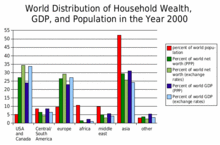 World distribution of wealth and population in 2000.
World distribution of wealth and population in 2000.
In the contemporary era, several issues are faced in the world.
First of all, wealth is concentrated among the G8 and Western industrialized nations, along with several Asian nations and OPEC countries. The richest 1% of adults alone owned 40% of global assets in the year 2000 and that the richest 10% of adults accounted for 85% of the world total.[63] The bottom half of the world adult population owned barely 1% of global wealth.[63] Another study found that the richest 2% own more than half of global household assets.[64] Despite this, the distribution has been changing quite rapidly in the direction of greater concentration of wealth.[65] Nevertheless, powerful nations with large economies and wealthy individuals can improve the rapidly evolving economies of the Third World. However, developing countries face many challenges, including the scale of the task to be surmounted, rapidly growing populations, and the need to protect the environment, and the cost that goes along with facing such challenges.
Secondly, disease threatened to destabilize many regions of the world. New viruses such as SARS, West Nile, and Bird Flu continued to spread quickly and easily. In poor nations, malaria and other diseases affected the majority of the population. Millions were infected with HIV, the virus which causes AIDS. The virus was becoming an epidemic in southern Africa. Even problems with non-bacterial diseases has been raised in the world - innovations in the technology in the western world, by the 1900th spread of sedentary lifestyle where TV, computers, fast food and elevator has caused obesity become a global challenge. This causes challenges on the global economy since obesity is linked to a broad kind of diseases. This problem has even been influenced previously famine parts of the world where obesity lives beside poverty.
Terrorism, dictatorship, and the spread of nuclear weapons were also issues requiring immediate attention. Dictators such as Kim Jong-il in North Korea continued to lead their nations toward the development of nuclear weapons. The fear existed that not only are terrorists already attempting to get nuclear weapons, but that they have already obtained them.
Climate change
Main article: Climate changeFor more details on this topic, see Effects of global warming.Climate change and global warming reflects the notion of the modern climate. The changes of climate over the past century, have been attributed of to various factors which have resulted in a global warming. This warming is the increase in the average temperature of the Earth's near-surface air and oceans since the mid-20th century and its projected continuation. Some effects on both the natural environment and human life are, at least in part, already being attributed to global warming. A 2001 report by the IPCC suggests that glacier retreat, ice shelf disruption such as that of the Larsen Ice Shelf, sea level rise, changes in rainfall patterns, and increased intensity and frequency of extreme weather events are attributable in part to global warming.[66] Other expected effects include water scarcity in some regions and increased precipitation in others, changes in mountain snowpack, and adverse health effects from warmer temperatures.[67]
It usually is impossible to connect specific weather events to human impact on the world. Instead, such impact is expected to cause changes in the overall distribution and intensity of weather events, such as changes to the frequency and intensity of heavy precipitation. Broader effects are expected to include glacial retreat, Arctic shrinkage, and worldwide sea level rise. Other effects may include changes in crop yields, addition of new trade routes,[68] species extinctions,[69] and changes in the range of disease vectors. Until 2009, the Arctic Northwest Passage pack ice prevented regular marine shipping throughout most of the year in this area, but climate change has reduced the pack ice, and this Arctic shrinkage made the waterways more navigable.[70][71][72][73]
Emerging technologies
Various emerging technologies, the recent developments and convergences in various fields of technology, hold possible future impacts. Emerging technologies cover various cutting-edge developments in the emergence and convergence of technology, including transportation, information technology, biotechnology, robotics and applied mechanics, and material science. Their status and possible effects involve controversy over the degree of social impact or the viability of the technologies. Though, these represent new and significant developments within a field; converging technologies represent previously distinct fields which are in some way moving towards stronger inter-connection and similar goals.
See also
- General
- Present-day, Current affairs news, Contemporary society, Contemporary philosophy, International organization, International security, International trade, Global Environment Facility, International Energy Agency, Synchronicity, Hypertext, CD-ROM, Energy World, Biotechnology, Biodiversity, Alternate history, Future history
- Policy and bureaucracy
- Public Policy, Energy Task Force, Environmental Policy
- People's generation
- Generation, List of generations, Baby Boom Generation, Generation X, MTV Generation, Generation Y, Generation Z
- Music and arts
- Popular culture, Contemporary art, Contemporary dance, Contemporary literature, Contemporary music, Contemporary hit radio, Adult contemporary music, Contemporary Christian music, Contemporary R&B, Urban contemporary
- Agriculture and food
- Green Revolution, Food security, Consultative Group on International Agricultural Research, Sustainable agriculture, Organic farming
- Energy and power
- Wind Power, Photovoltaic, solar power, Wind turbines, Fossil fuels, Hydropower, Biomass
- War and warfare
- Laws of war, Principles of War, Command Papers, Strategic Studies Institute, U.S. Military Academy, Army War College, Information warfare, Unity of command, National Military Strategy, Guerrilla warfare, Asymmetric warfare
Further reading
- Boyd, Andrew, Joshua Comenetz. An atlas of world affairs. Routledge, 2007. ISBN 0415391695
- Black, Edwin. Internal Combustion: How Corporations and Governments Addicted the World to Oil and Derailed the Alternatives. New York: St. Martin's Press, 2006.
- Briggs, Asa, and Peter Burke. A Social History of the Media: From Gutenberg to the Internet. Cambridge: Polity, 2002.
- Barzun, Jacques. From Dawn to Decadence: 500 Years of Western Cultural Life : 1500 to the Present. New York: HarperCollins, 2001.
References
General
- Internet Modern History Sourcebook, fordham.edu
Footnotes
- ^ e.g. Edinburgh review, Volume 12 (1808) p. 480 (cf., There is this general distinction between contemporary history and all other history, —that the former is a witness, the latter a judge. The opinions of a contemporary author on the events which he records, are only then authority, when the impression made on a bystander happens to be a material part of the case; nor is this any exception to the maxim, that his business is to testify, not to lecture. On facts, however, he is paramount evidence; and that, not only in the age immediately succeeding him, but also, which is generally forgotten, to the latest times. The modern historian, who consults original authorities through the-medium of some later predecessor, descends from the character of a judge to that of a faithful reporter of decisions.)
- ^ a b Grosvenor, Edwin A. Contemporary History of the World. New York and Boston: T.Y. Crowell & Co, 1899.
- ^ worldometers.info, Real Time Statistics Project.
- ^ Such as the Eritrean War of Independence and the wars in Sierra Leone, Nigeria, Liberia, Ivory Coast, Guinea-Bissau Congo, Rwanda, Uganda, Ethiopia, Mozambic, Sudan, and the Chad.
- ^ "Core Characteristics of Web 2.0 Services". http://www.techpluto.com/web-20-services/.
- ^ a b 2007 est.
- ^ Nick Gillespie (2008). "What Slumdog Millionaire can teach Americans about economic stimulus". Reason. http://www.reason.com/blog/show/131810.html.
- ^ CIA Factbook: Economy. cia.gov.
- ^ "The India Report". Astaire Research. http://www.ukibc.com/ukindia2/files/India60.pdf.
- ^ "Economic survey of India 2007: Policy Brief". OECD. http://www.oecd.org/dataoecd/17/52/39452196.pdf.
- ^ NATO-Russia council Statement
- ^ NATO's relations with Russia
- ^ NATO-Russia council on Terrorism
- ^ NATO-Russia to practise anti-terrorist response
- ^ RFS and NATO ships joint manoeuvres
- ^ Allies and Russia attend U.S. Nuclear Weapons Accident Exercise
- ^ Fact sheet of NATO-Russia Council practical cooperation
- ^ "Security Council Condemns, 'In Strongest Terms', Terrorist Attacks on the United States". United Nations. September 12, 2001. http://www.un.org/News/Press/docs/2001/SC7143.doc.htm. Retrieved 2006-09-11. "The Security Council today, following what it called yesterday’s "horrifying terrorist attacks" in New York, Washington, D.C., and Pennsylvania, unequivocally condemned those acts, and expressed its deepest sympathy and condolences to the victims and their families and to the people and Government of the United States."
- ^ "Bin Laden claims responsibility for 9/11". CBC News. 2004-10-29. http://www.cbc.ca/world/story/2004/10/29/binladen_message041029.html. Retrieved 2009-01-11. "Al-Qaeda leader Osama bin Laden appeared in a new message aired on an Arabic TV station Friday night, for the first time claiming direct responsibility for the 2001 attacks against the United States."
- ^ "The Taliban Resurgence in Afghanistan". http://www.cfr.org/publication/10551/.
- ^ Rothstein, Hy S (2006-08-15). Afghanistan: and the troubled future of unconventional warfare By Hy S. Rothstein. ISBN 9788170493068. http://books.google.com/?id=w7fmg1cCjskC&dq=Afghanistan+and+the+troubled+future+of+unconventional+warfare&q=Al+Qaeda.
- ^ Gall, Carlotta (September 3, 2006). "Opium Harvest at Record Level in Afghanistan". The New York Times. http://www.nytimes.com/2006/09/03/world/asia/03afghan.html. Retrieved April 30, 2010.
- ^ "Afghanistan opium at record high". BBC News. August 27, 2007. http://news.bbc.co.uk/2/hi/south_asia/6965115.stm. Retrieved January 2, 2010.
- ^ "Afghanistan could return to being a ‘failed State,’ warns Security Council mission chief". http://www.un.org/apps/news/story.asp?NewsID=20702&Cr=afghan&Cr1=.
- ^ "US Names Coalition of the Willing". BBC News. March 18, 2003. http://news.bbc.co.uk/2/hi/americas/2862343.stm. Retrieved 2007-11-03.
- ^ U.S. Defense Secretary Robert Gates, 2 Feb 2007, see "four wars" remark
- ^ "CBS on civil war". CBS News. September 26, 2006. http://www.cbsnews.com/stories/2005/09/26/eveningnews/main886305.shtml.
- ^ Britain's Brown visits officials, troops in Iraq. International Herald Tribune, October 2, 2007.
- ^ Italy plans Iraq troop pull-out BBC March 15, 2005
- ^ Agreement Between the United States of America and the Republic of Iraq On the Withdrawal of United States Forces from Iraq and the Organization of Their Activities during Their Temporary Presence in Iraq
- ^ whitehouse.archives.gov. news releases 2008-11
- ^ Strategic Framework Agreement (pdf bitmap)
- ^ English Language Teaching and Learning Program (US State Dept.)
- ^ Karadsheh, J. (November 27, 2008) "Iraq parliament OKs pact on U.S. troops' future" CNN
- ^ 'Global War On Terror' Is Given New Name, Scott Wilson and Al Kamen, The Washington Post, March 25, 2009; Page A04
- ^ "Presidential Address to the Nation" (Press release). The White House. October 7, 2001. http://georgewbush-whitehouse.archives.gov/news/releases/2001/10/print/20011007-8.html.
- ^ "Counterterrorism and Terrorism". Federal Bureau of Investigation. http://www.fbi.gov/terrorinfo/counterrorism/waronterrorhome.htm. Retrieved 2008-04-14.
- ^ A History of Conflict:introduction, BBC
- ^ "Just another forgotten peace summit." Haaretz.com. By Prof. Ephraim Yaar and Prof. Tamar Hermann. Published 11/12/2007.
- ^ Poll on Palestinian attitudes - Jerusalem Media and Communications Centre.
- ^ Kurtzer, Daniel and Scott Lasensky. "Negotiating Arab-Israeli Peace ..." Google Book Search. 30 January 2009.
- ^ Dershowitz, Alan. The Case for Peace: How the Arab-Israeli Conflict Can Be Resolved. Hoboken: John Wiley & Sons, Inc., 2005
- ^ Israel: The Alternative, The New York Review of Books, Volume 50, Number 16, October 23, 2003
- ^ Virginia Tilley, The One-State Solution, University of Michigan Press (May 24, 2005), ISBN 0472115138
- ^ "Jarvis, Jonathan. Crisis of Credit". crisisofcredit.com
- ^ This American Life. "NPR-The Giant Pool of Money-April 2009". Pri.org. http://www.pri.org/business/giant-pool-of-money.html. Retrieved May 1, 2010.
- ^ In December 2008, the National Bureau of Economic Research (NBER) declared that the United States had been in recession since December 2007. See Isidore, Chris (2008-12-01). "It's official: Recession since Dec '07". CNN Money. http://money.cnn.com/2008/12/01/news/economy/recession/index.htm?postversion=2008120112. Retrieved 2009-04-10. for more information.
- ^ Mark Hulbert (July 15, 2010). "It's Dippy to Fret About a Double-Dip Recession". http://online.barrons.com/article/SB50001424052970203983104575367471896032724.html?mod=googlenews_barrons.
- ^ Mishkin, Fredric S. (May 15, 2008). How Should We Respond to Asset Price Bubbles? (Speech). http://www.federalreserve.gov/newsevents/speech/mishkin20080515a.htm. Retrieved 2009-04-18.
- ^ See Great Recession for the origins and other uses of this label.
- ^ Wessel, David (2010-04-08). "Did 'Great Recession' Live Up to the Name?". The Wall Street Journal. http://online.wsj.com/article/SB10001424052702303591204575169693166352882.html.
- ^ One of the major developments was when Standard & Poor's downgraded Greece's sovereign credit rating to junk four days after the activation of a €45-billion EU–IMF bailout, triggering the decline of stock markets worldwide and of the Euro's value, and furthered the European sovereign debt crisis.
- ^ Hegeler, E. C., & Carus, P. (1890). The Monist. La Salle, Ill. [etc.]: Published by Open Court for the Hegeler Institute. page 443.
- ^ Sattig, T. (2006). The language and reality of time. Oxford: Clarendon Press. Page 37.
- ^ James, W. (1893). The principles of psychology. New York: H. Holt and Company. Page 609.
- ^ Hodder, A. (1901). The adversaries of the sceptic; or, The specious present, a new inquiry into human knowledge. Chapter II, The Specious Present. London: S. Sonnenschein &. Pages 36–56.
- ^ Robert V. Daniels, "History", Encyclopedia Americana, 1986 ed., vol. 14, p. 227.
- ^ George Santayana, "The Life of Reason", Volume One, p. 82, BiblioLife, ISBN 978-0559478062
- ^ Arnold J. Toynbee, A Study of History, vols. I–XII, Oxford University Press, 1934–61.
- ^ Will and Ariel Durant, The Lessons of History, New York, Simon and Schuster, 1968, prelude.
- ^ Berkeley Eddins and Georg G. Iggers, "History", Encyclopedia Americana, 1986 ed., vol. 14, pp. 243–44.
- ^ For the multidisciplinary area of research focused at mathematical modeling of historical dynamics that can be applied to events, see Cliodynamics
- ^ a b Extensive statistics, many indicating the growing world disparity, are included in the available report, press releases, Excel tables and Powerpoint slides. See The World Distribution of Household Wealth. James B. Davies, Susanna Sandstrom, Anthony Shorrocks, and Edward N. Wolff. 5 December 2006.
- Launch of the WIDER study on The World Distribution of Household Wealth (includes press release, summary, and data)
- Estimating the Level and Distribution of Global Household Wealth (copy of full report with a cover page added)
- The World Distribution of Household Wealth (exact copy of report published at United Nations website) For more.
- ^ The rich really do own the world 5 December 2006
- ^ "Wealth Inequality Charts"
- ^ "Climate Change 2001: Impacts, Adaptation and Vulnerability. Contribution of Working Group II to the Third Assessment Report of the Intergovernmental Panel on Climate Change". IPCC. 2001-02-16. http://www.grida.no/climate/ipcc_tar/wg2/index.htm. Retrieved 2007-03-14.
- ^ McMichael AJ, Woodruff RE, Hales S (2006). "Climate change and human health: present and future risks". Lancet 367 (9513): 859–69. doi:10.1016/S0140-6736(06)68079-3. PMID 16530580.
- ^ Macey, Jennifer (September 19, 2007). "Global warming opens up Northwest Passage". ABC News. http://www.abc.net.au/news/stories/2007/09/19/2037198.htm?section=business. Retrieved 2007-12-11.
- ^ "Climate Change 2007: Synthesis report" (PDF). Climate Change 2007: Synthesis Report. IPCC. 2007-02-05. http://www.ipcc.ch/pdf/assessment-report/ar4/syr/ar4_syr.pdf. Retrieved 2009-02-03.
- ^ European Space Agency, “News: Satellites Witness Lowest Arctic Ice Coverage in History,” September 14, 2007.
- ^ "Warming 'opens Northwest Passage'". BBC News. September 14, 2007.
- ^ BBC News "Plain Sailing on the Northwest Passage"
- ^ Keating, Joshua E. (December 2009). "The Top 10 Stories You Missed in 2009: A few ways the world changed while you weren’t looking". Foreign Policy. http://www.foreignpolicy.com/articles/2009/11/30/the_top_10_stories_you_missed_in_2009.
Categories:
Wikimedia Foundation. 2010.

